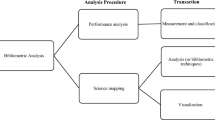Abstract
Peer review is a basic component of the scientific process, but its performance has seldom been evaluated systematically. To determine whether pre-approval characteristics of research projects predicted the performance of projects, we conducted a retrospective cohort study of all 2744 single-centre research projects financed by the Spanish Health Research Fund since 1988 and completed before 1996. Peer review scores of grant applications were significant predictors of performance of funded projects, and the likelihood of production was also higher for projects with a basic research component, longer duration, higher budget or a financed research fellow. Funding agencies should monitor their selection process and assess the performance of funded projects to design future strategies in supporting health sciences research.
Similar content being viewed by others
References
N. J. Birkett, The review process for applied-research grant proposals: suggestions for revision, Canadian Medical Association Journal, 150 (1994) 1227–1229.
R. Smith, Problems with peer review and alternatives, British Medical Journal, 296 (1988) 774–777.
S. A. Glantz, L. A. Bero, Inappropriate and appropriate selection of ‘peers’ in grant review, The Journal of the American Medical Association, 272 (1994) 114–116.
A. T. Evans, R. A. McNutt, S. W. Fletcher, R. H. Fletcher, The characteristics of peer reviewers who produce good-quality reviews, Journal of General Internal Medicine, 8 (1993) 422–428.
S. Wessely, Peer review of grant applications: what do we know?, Lancet, 352 (1998) 301–305.
National Institutes of Health, NIH peer review of research grant applications, US Department of Health and Human Services, Public Health Service, National Institutes of Health, Bethesda, 1996.
Biomedical AND Health Research Programme, Biomed 2 (1994–1998), Guide to the evaluation and the selection of proposals, European Comission, Directorate General XII for Science, Research and Development, Brussels, 1996, 1–22.
E. Guallar, J. Conde, M. A. De La Cal, J. M. MartÍn-Moreno, en nombre del Grupo de Evaluación de la Actividad del Fondo de Investigaciones Sanitarias entre 1988 y 1995, Guía para la evaluacion de proyectos de investigación en ciencias de la salud, Medicina Clinica, 108 (1997) 460–471.
Committee on rating grant applications, National Institutes of Health, Report of the committee on rating grant applications, World Wide Web http://www.nih.gov/grants/peer/rga.htm, 1996, 1–32.
J. R. Ricoy, M. F. Guasch, L. E. ClaverÍa, Fondo de Investigación Sanitaria (1988–1995). Una aproximación al análisis de un Programa I+D, Instituto Nacional de la Salud, Madrid, 1996.
J. R. Ricoy, La financiación de la investigación médica, Medicina Clinica, 100 (1993) Suppl. 1, 6–8.
P. McCullagh, J. A. Nelder, Generalized linear models, Chapman and Hall, London, 1989.
T. J. Hastie, R. J. Tibshirani, Generalized additive models, Chapman and Hall, London, 1990.
SAS Institute Inc, SAS language: reference, version 6, SAS Institute Inc, Cary, NC, 1990.
Statistical Science Inc, S-PLUS reference manual, version 3.2, MathSoft Inc, Seattle, 1993.
R. Smith, Promoting research into peer review [editorial] (see comments), British Medical Journal, 309 (1994) 143–144.
C. A. Olsson, W. A. Kennedy, Urology peer review at the National Institutes of Health, Journal of Urology, 154 (1995) 1866–1869.
H. J. Sutherland, E. M. Meslin, R. Da Cunha, J. E. Till, Judging clinical research questions: what criteria are used?, Social Science and Medicine, 37 (1993) 1427–1430.
K. J. Vener, E. J. Feuer, L. Gorelic, A statistical model validating triage for the peer review process: keeping the competitive applications in the review pipeline, FASEB Journal, 7 (1993) 1312–1319.
F. J. Medman, R. A. De Melker, The extent of inter-and intrareviewer agreement on the classification and assessment of designs of single-practice research, Family Practice, 12 (1995) 93–97.
R. K. Merton, The Matthew effect in science, Science, 159 (1968) 36–63.
R. K. Merton, The Matthew effect in science. II. Cumulative advantages and the symbolism of intellectual property, Isis, 79 (1988) 606–623.
National Institutes of Health, PHS grants policy statement, US Department of Health and Human Services, Public Health Service, Washington, 1987.
D. F. Horrobin, Referees and research administrators: barriers to scientific research?, British Medical Journal, 2 (1974) 216–218.
D. F. Horrobin, Peer review of grant applications: a harbinger of mediocrity in clinical research, Lancet, 348 (1996) 1293–1295.
J. P. Kassirer, E. W. Campion, Peer review: crude and understudied, but indispensable, The Journal of the American Medical Association, 272 (1994) 96–97.
A. Abbott, Funding cuts put pressure on peer review, Nature, 383 (1996) 567.
Author information
Authors and Affiliations
Rights and permissions
About this article
Cite this article
Clavería, L.E., Guallar, E., Camí, J. et al. Does Peer Review Predict the Performance of Research Projects in Health Sciences?. Scientometrics 47, 11–23 (2000). https://doi.org/10.1023/A:1005609624130
Issue Date:
DOI: https://doi.org/10.1023/A:1005609624130




